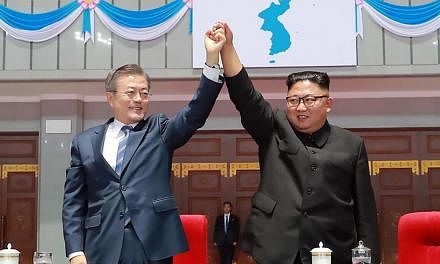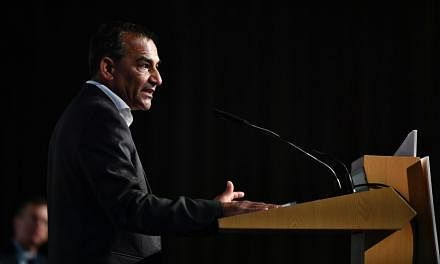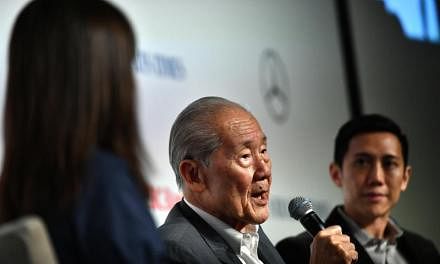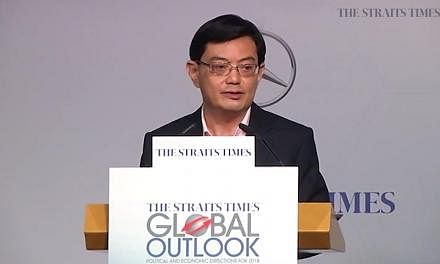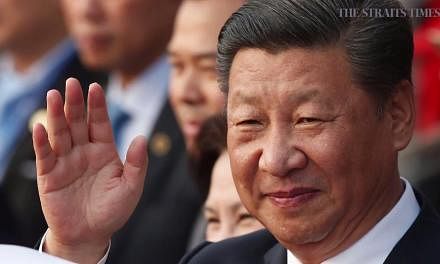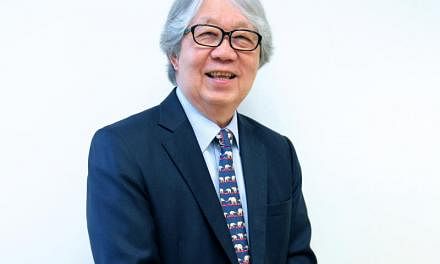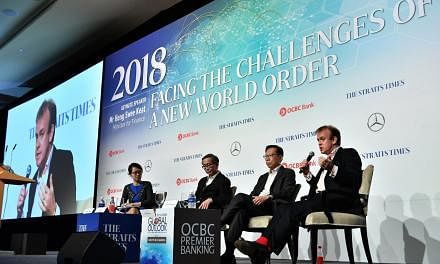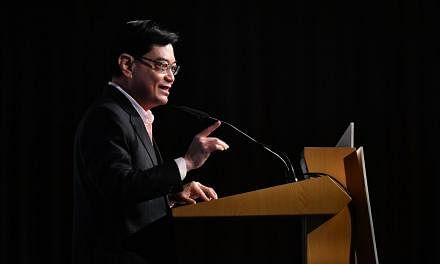SINGAPORE - The rise of US President Donald Trump as well as populism in the West reflect a loss of faith in the establishment, but the strength of institutions means the US will recover quickly from its retreat from the world, experts said at The Straits Times Global Outlook Forum on Tuesday (Dec 5).
Meanwhile, China, which is playing a bigger global role amid the US' seeming retreat, is likely to face considerable problems with its Belt and Road Initiative to link countries in Asia and Europe, and it will be difficult to get the ambitious project off the ground, prominent China watcher Wang Gungwu said at the event.
"Discontent over globalisation is what caused the Trump phenomenon and Brexit" as well as the rise of far-right parties elsewhere in Europe, NUS political science Associate Professor Elvin Lim told 320 participants at the ST forum.
Mr Trump won the US election last year on the back of an anti-establishment platform and has since withdrawn, or threatened to withdraw, the US from several global pacts and agencies, including the Paris Agreement on climate action and the Trans-Pacific Partnership on free trade.
Prof Lim said widespread discontentment with the inequalities brought about by free trade will continue until people accept that globalisation, as with any system, is bound to give rise to winners and losers. "Only then are we are going to be less strident about it," he said.
To address the discontent, leaders should not lose sight of reality and pay attention to the losses engendered by globalisation, said Prof Lim.
One approach is to build institutions at a local level, rather than supranational ones like the United Nations, to address popular discontent, said Prof Lim.
"What's missing are our local clubs, what makes democracy thrive is these local associations, private clubs, civic associations, churches, institutions that people are familiar with," said Prof Lim.
He said such local institutions could serve as the bridge to globalised ones. "That type of institution building must happen otherwise globalisation will consume us."
Professor Wang Gungwu, chairman of the ISEAS-Yusof Ishak Institute and the East Asian Institute at the National University of Singapore, was confident, however, that institutions in the West would prevail and by extension, America's leading role in the world.
"The US is going through a tough period but history shows it will recover quickly. They have strong institutions, the whole US population have been involved in the changes of the last two centuries and the country's participatory democracy is what few countries can boast of," Prof Wang said at the ST forum.
"It has had moments of loss of faith but the institutions are much stronger than any other instutiions i know of elsewhere."
Not least of which is China, whose profile in the world is rising amid the US' seeming retreat. The lack of strong institutions "will always make things more unstable in China", said Prof Wang.
China is expanding its global clout through the mammoth Belt and Road Initiative, but faces considerable problems at the practical level , he said.
He pointed to the strife-ridden history of Eurasia and the cost of the grandiose scheme unveiled by President Xi Jinping in 2013.
The BRI envisages a massive nexus of ports, railways, roads and industrial parks connecting some 65 countries from China to North Africa, by way of Central Asia and Europe.
But Prof Wang said: "Different countries with different interests have to overcome lots of suspicion on what it (BRI) is all about."
"Here and there China will make some successes but if very few countries join in it won't get very far."
Still, on another, higher level, said Prof Wang, China has managed to achieve something else through the BRI. "It is a visionary way of saying to the world that China's attention will be on Eurasia, not on challenging the US across the Pacific," said Prof Wang.
"It's going to focus for the next decade or so on Eurasia."
Titled 'Facing the challenges of a new world order', this year's ST Global Outlook Forum was attended by more than 320 participants.
OCBC Premier Banking is the presenting sponsor for the forum and Mercedes-Benz is the official car for the event.

